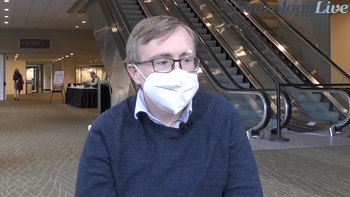
The assistant professor of neurology at the University of Pennsylvania discussed stroke risk among patients with COVID-19 and the need to seek neurological consultation. [WATCH TIME: 3 minutes]

The assistant professor of neurology at the University of Pennsylvania discussed stroke risk among patients with COVID-19 and the need to seek neurological consultation. [WATCH TIME: 3 minutes]

Following their data presentation on AMX0035 at AAN 2022, Justin Klee and Josh Cohen, the co-CEOs and co-founders of Amylyx Pharmaceuticals, shared their perspectives on the agent.

In addition to significantly less disability observed in tenecteplase-treated patients, this group was also administered treatment 9.40 minutes faster than those on alteplase.
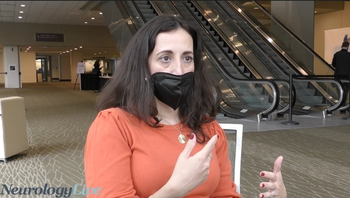
The professor of neurology at NYU Langone Grossman School of Medicine broke down the knowns and unknowns about long-term changes related to COVID-19, their legitimacy, and associations with neurodegenerative disorders. [WATCH TIME: 6 minutes]

Data presented at the 2022 AAN Annual Meeting from the ALITHIOS and KYRIOS trials suggest that ofatumumab (Kesimpta; Novartis), an anti-CD20 therapy, is safe with up to 4 years of treatment and does not prevent the mounting of an immune response to mRNA vaccines.

After showing several significant differences between placebo, the company has planned a phase 3 study that will assess the therapeutic in a cohort of 230 adults with FSHD.

Among triptan non/past use and current use patients, investigators observed refill decreases of 15.3% and 16.8%, respectively, in the 9 months following rimegepant treatment.

Mind Moments®, a podcast from NeurologyLive®, brings you exclusive interviews with Jennifer Frontera, MD; Stephen Krieger, MD; Peter McAllister, MD; Kelly Knupp, MD, MSCS; Bruce Cree, MD, PhD, MAS; Shrujal Baxi, MD, MPH; and Indu Subramanian, MD. [LISTEN TIME: 32 minutes]
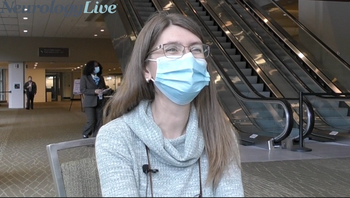
The pediatric neurologist and epilepsy specialist at Colorado Children’s Hospital discussed new data presented at AAN 2022 on the use of recently approved fenfluramine in patients with Lennox-Gastaut syndrome. [WATCH TIME: 3 minutes]

As a result of treatment with the Vercise Genus DBS system, patients reduced their use of anti-parkinsonian medications while maintaining improvements in quality of life.

Following the switch to ubrogepant, more than half of patients with migraine had reduced use of triptans and more than one-third of patients had reduced use of anti-inflammatory drugs.
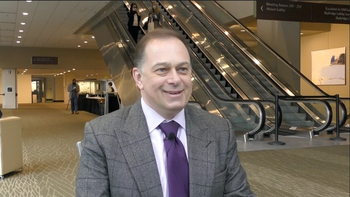
The clinical research director of the UCSF Multiple Sclerosis Center offer his perspective on the 3 available agents for the treatment of patients with neuromyelitis optica spectrum disorder. [WATCH TIME: 2 minutes]

Dejan Jakimovski, MD, PhD, research assistant professor, Buffalo Neuroimaging Analysis Center, discussed his presentation at AAN 2022 on the associations between cerebral hypoperfusion and increased axonal pathology in MS.
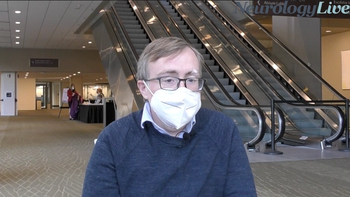
The assistant professor of neurology at the University of Pennsylvania discussed the similarities observed between the results of neurological exams in patients with COVID-19 vs other respiratory infections. [WATCH TIME: 3 minutes]

Seth M. Keller, MD, chair of the Section for Adults With IDDs at AAN, shared his perspective on the state of care for these individuals and the need to improve the difficulties they face when transitioning out of pediatric care.
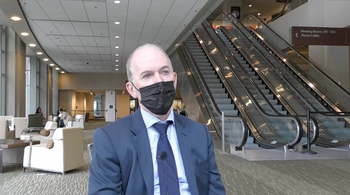
The medical director and chief medical officer of the New England Center for Neurology and Headache spoke to the phase 2 STEMTRA trial results of the stem cell treatment SB623. [WATCH TIME: 4 minutes]

All patients received 100% of the intended stimulations, with no reported deaths, stimulation site reactions, or any cases of acute coronary syndrome or symptomatic intracerebral hemorrhage.

Among those who took their second nighttime sodium oxybate dose 4 hours after their first, 42% claimed they felt somewhat, quite a bit, or extremely groggy or unsteady the next morning.

The director of the Parkinson’s Disease and Movement Disorder Center at the University of South Florida detailed the data presented at AAN 2022 and IPX-203’s potential in Parkinson disease. [WATCH TIME: 3 minutes]

The pediatric epileptologist at Cleveland Clinic’s Epilepsy Center discussed data presented at AAN 2022 on the use of ganaxolone in CDD, as well as how its recent approval sets the stage for the future.

Low annualized relapse rates determined by investigator were observed and sustained over a 3.5-year period with treatment of satralizumab.

In the AAN 2022 presidential plenary session, a trio of neurologists discussed a variety of issues stemming from the COVID-19 pandemic and how they impacted research efforts in neurological diseases.

The Pharma Two B therapy combines a dopamine agonist, pramipexole, and an MAO-B inhibitor, rasagiline, and has shown significant improvements on UPDRS total scores and ESS scores for untreated patients with PD.

At week 26, patients on ABBV-951 had mean increases of 3.24 hours in ON time and decreases of 2.94 hours of OFF time, which was similar to previously reported studies.

The resident physician at Montefiore Medical Center shared her experience with the novel and standardized quick examination tool and the data presented at AAN 2022. [WATCH TIME: 3 minutes]

One-year data from the single-arm phase 3b CONSONANCE trial (NCT03523858) suggest that the Genentech agent (Ocrevus) resulted in low levels of disease activity and improved cognitive performance in those with secondary and primary progressive multiple sclerosis.

In an AAN 2022 Hot Topics plenary session, Miranda E. Orr, PhD, highlighted the potential of targeting senescent cells with senolytics as a therapeutic approach to age-related diseases such as Alzheimer disease, and detailed the ongoing phase 2 SToMP-AD clinical trial (NCT04685590).
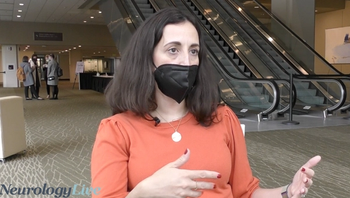
The professor of neurology at NYU Langone Grossman School of Medicine discussed her talk at AAN 2022 on neurological sequelae and follow-up in hospitalized and nonhospitalized patients with COVID-19. [WATCH TIME: 8 minutes]

After switching from nusinersen to Zolgensma 147 days into life, the infant scored a 64 on CHOP-INTEND score, considerably higher than what is observed in the natural history.

In an assessment including 23 patients, the novel and standardized quick neurologic examination showed excellent interrater reliability and agreement, suggesting good validity.